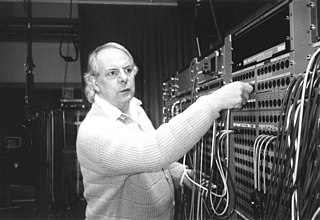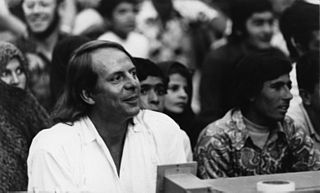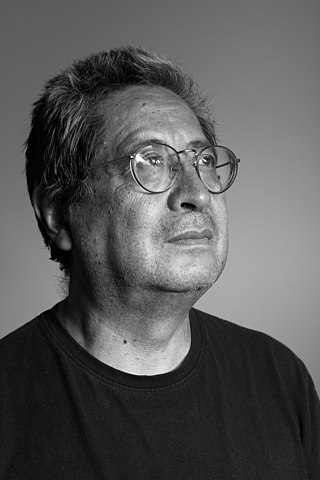Thomas H. Wells (born January 8, 1945, in Austin, Texas) is an American composer, pianist, organist, and arts-organization administrator.
Thomas H. Wells (born January 8, 1945, in Austin, Texas) is an American composer, pianist, organist, and arts-organization administrator.
Thomas Wells began his formal composition studies at the University of Texas at Austin in 1960 with Kent Kennan and Clifton Williams. He received his Bachelor of Music (1966) and D.M.A. (1969) degrees from that institution, studying with Hunter Johnson. Wells founded the University of Texas Electronic Music Studio in 1967 and served as its director until 1975. He was accepted in Karlheinz Stockhausen's Composition Studio in Darmstadt in 1968, and participated in the project Musik für ein Haus . [1] Wells joined the faculty of the Ohio State University School of Music in 1976, and continues to teach there as Professor of Composition and Director of the Sound Synthesis Studios. [2] In addition, he has served as guest professor and artist in residence at the University of Novi Sad (Serbia), Johannes Gutenberg University (Mainz), and Ball State University. His works have been performed throughout the U.S., Europe, Japan, and Korea, and by orchestras and ensembles such as the Dallas Symphony Orchestra, Spokane Symphony, Columbus Symphony, and the Pittsburgh New Music Ensemble.
He has received grants and commissions from the National Endowment for the Arts, Ohio Arts Council, Ohio Humanities Council, Pennsylvania Council on the Arts, and the Texas Commission on the Arts. Wells received the Governor's Award in the State of Ohio for Outstanding Individual Artist in 1990. He hosted the 1984 Society of Composers National Conference (Frank Zappa, keynote speaker), and the 1989 International Computer Music Conference, both at The Ohio State University in Columbus, Ohio. He is active in the 1500-member Society of Composers, serving as its president from 2002 to the present.
Wells' instrumental music is strongly influenced by Varèse, Stockhausen, electroacoustic music, and spectral music.

Karlheinz Stockhausen was a German composer, widely acknowledged by critics as one of the most important but also controversial composers of the 20th and early 21st centuries. He is known for his groundbreaking work in electronic music, having been called the "father of electronic music", for introducing controlled chance into serial composition, and for musical spatialization.
David C. Johnson was an American composer, flautist, and performer of live electronic music.

Darmstädter Ferienkurse is a regular summer event of contemporary classical music in Darmstadt, Hesse, Germany. It was founded in 1946, under the name "Ferienkurse für Internationale Neue Musik Darmstadt", as a gathering with lectures and concerts over several summer weeks. Composers, performers, theorists and philosophers of contemporary music met first annually until 1970, and then biennially. The event was organised by the Kranichsteiner Musikinstitut, which was renamed Internationales Musikinstitut Darmstadt (IMD). It is regarded as a leading international forum of contemporary and experimental music with a focus on composition. The festival awards the Kranichsteiner Musikpreis for performers and young composers.

Aus den sieben Tagen is a collection of 15 text compositions by Karlheinz Stockhausen, composed in May 1968, in reaction to a personal crisis, and characterized as "Intuitive music"—music produced primarily from the intuition rather than the intellect of the performer(s). It is Work Number 26 in the composer's catalog of works.
Boudewijn Buckinx is a Belgian composer and writer on music.
Junsang Bahk is a celebrated Korean composer, also active in Austria.

Mesías Maiguashca is an Ecuadorian composer and an advocate of Neue Musik, especially electroacoustic music.
Alden Jenks is an American composer.
Intuitive music is a form of musical improvisation based on instant creation in which fixed principles or rules may or may not have been given. It is a type of process music where instead of a traditional music score, verbal or graphic instructions and ideas are provided to the performers. The concept was introduced in 1968 by the German composer Karlheinz Stockhausen, with specific reference to the collections of text-notated compositions Aus den sieben Tagen (1968) and Für kommende Zeiten (1968–70). The first public performance of intuitive-music text compositions, however, was in the collective work Musik für ein Haus, developed in Stockhausen's 1968 Darmstadt lectures and performed on 1 September 1968, several months before the first realisations of any of the pieces from Aus den sieben Tagen.
Costin Miereanu is a French composer and musicologist of Romanian birth.
York Höller is a German composer and professor of composition at the Hochschule für Musik Köln.
Avo Sõmer is an American musicologist, music theorist, and composer, of Estonian birth.
John McGuire is an American composer, pianist, organist, and music editor.
Erich Urbanner is an Austrian composer and teacher.

Fresco is an orchestral composition written in 1969 by the German composer Karlheinz Stockhausen as foyer music for an evening-long retrospective programme of his music presented simultaneously in three auditoriums of the Beethovenhalle in Bonn. It is Nr. 29 in his catalogue of works, and a performance takes about five hours.

Punkte (Points) is an orchestral composition by Karlheinz Stockhausen, given the work number ½ in his catalogue of works.
Drei Lieder, for alto voice and chamber orchestra, is a song cycle by Karlheinz Stockhausen, written while he was still a conservatory student in 1950. In the composer's catalogue of works, it bears the number 1/10.

Ensemble is a group-composition project devised by Karlheinz Stockhausen for the 1967 Darmstädter Ferienkurse. Twelve composers and twelve instrumentalists participated, and the resulting performance lasted four hours. It is not assigned a work number in Stockhausen's catalogue of works.

Musik für ein Haus is a group-composition project devised by Karlheinz Stockhausen for the 1968 Darmstädter Ferienkurse. Fourteen composers and twelve instrumentalists participated, with the resulting performance lasting four hours. It was not regarded by Stockhausen as a composition belonging solely to himself, and therefore was not assigned a number in his catalog of works.
Michael Svoboda is an American composer and trombonist who lives and works in Switzerland.
Sources